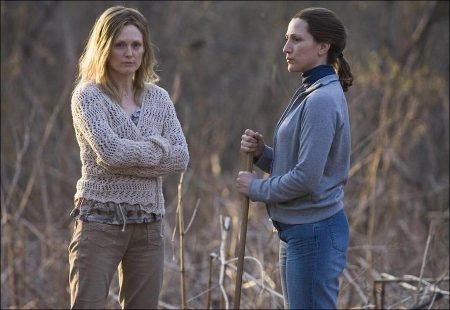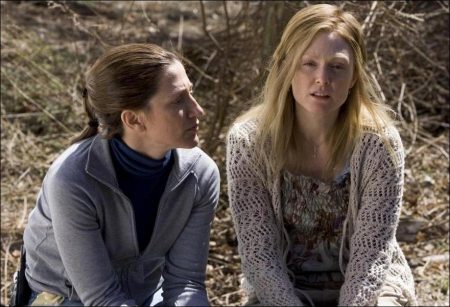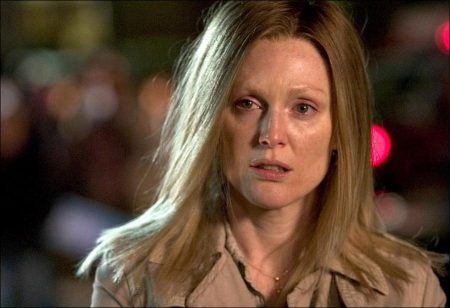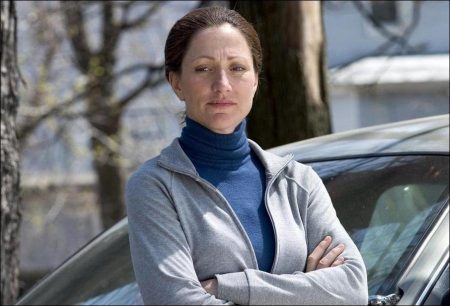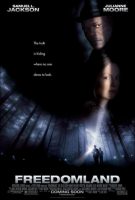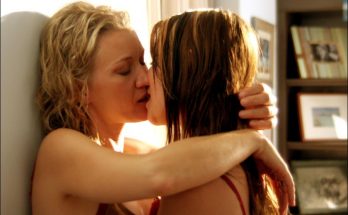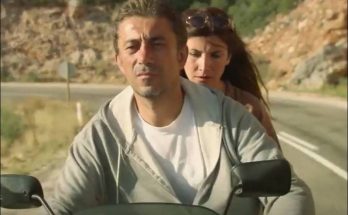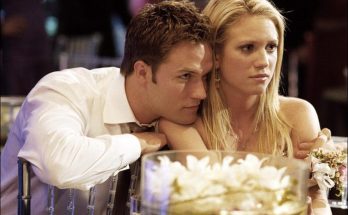Tagline: The truth is hiding where no one dares to look.
Freedomland movie storyline. A white woman blames an African-American man for the death of her son, but a white reporter and an African- American detective think otherwise. Based on Richard Price’s bestselling novel, which opens as a bruised and bloodied white woman named Brenda Martin stumbles into a Dempsey, New Jersey, emergency room, claiming that a black man stole her car with her four-year-old son in the backseat. Veteran detective Lorenzo Council is assigned to investigate the case, and despite reservations about Brenda’s story, he launches asearch for abducted boy.
Jesse Haus, an ambitious young reporter for the local newspaper, also suspects that Brenda is hiding something, and she befriends the grief-stricken mother in an attempt to break the biggest story of her career. But as the search for the alleged carjacker intensifies, smoldering racial tensions between the predominantly black city of Dempsey and its mostly white neighbor, Gannon, threaten to explode.
Late one night in a working class New Jersey suburb, a bloodied woman staggers mute and dazed into the emergency room at the Dempsy Medical Center. After treatment for shock and hysteria, Brenda Martin (Julianne Moore) recounts to Dempsy police detective Lorenzo Council (Samuel L. Jackson) — a horrific tale of being carjacked on the isolated strip of undeveloped land that divides Dempsy’s urban housing projects from the blue collar town of Gannon, where she lives.
She claims she was forced out of her car by a black man, but during the interrogation Council senses he’s not getting the whole story. Only after hours of questioning does Brenda finally break down and confess that her four-year-old son, Cody, was asleep in the back seat of the stolen car.
The Road to Freedomland
Scott Rudin, the prolific producer of such acclaimed films as The Hours, The Village and Closer, among many others, first met writer Richard Price when he served as a casting director on The Wanderers, the film adaptation of Price’s first novel. Later, as a producer, Rudin worked with Price when he called upon him to write the screenplays for Ron Howard’s film Ransom starring Mel Gibson, and for John Singleton’s Shaft starring Samuel L. Jackson. More recently, Scott Rudin optioned the film rights to Freedomland, a novel about the investigation of a carjacking, when Price was only about halfway through writing the book.
“One of the things about Scott, which I think makes him so successful, is that he knows exactly what he wants in a business where most everybody else is tentative and unsure,” says Price. “Then here comes Scott and he’s completely unconflicted.”
Rudin was eager for Price to adapt his novel to the screen because “Richard is the preeminent writer of social realism working in movies today. This movie is completely, squarely in his wheelhouse. He wrote a tremendous script and worked terrifically with (director) Joe Roth in honing it for the screen.
Freedomland takes place in two Northern New Jersey towns: Dempsy, a predominantly African-American working-class poor inner-city community, and Gannon, a neighboring, largely white blue-collar suburb. Both towns had served as the setting for one of Price’s earlier novels, Clockers.
When Gannon’s Brenda Martin (played by Julianne Moore) says that she was assaulted in a park next to a low-income housing project in Dempsy, and her car was stolen by a black man with her child asleep in the back, the hostility between the two communities escalates.
When Brenda arrives at the Dempsy hospital with the tale of her terrible ordeal, it is Detective Lorenzo Council (played by Samuel L. Jackson), big in size and personality, who handles her case. Price modeled the character of Lorenzo on Calvin E. Hart, a 21-year veteran of the Jersey City police force whom the author had first gotten to know while researching Clockers. Hart, a well-respected figure in Jersey City, not only enforces the law as a police officer, but also works with young people to help them find jobs and stay off drugs. “Sometimes I’m the only positive male role model they have,” Hart says. “So I do the things that I do to show kids that you can do anything that you want to do.”
Like Hart, Price’s Lorenzo is African-American and a pillar of the community. Lorenzo is especially beloved and respected by the residents of the Armstrong housing project, which is where the carjacking occurred. With this particular crime, Lorenzo finds himself under intense pressure to find the perpetrator.
“It’s a simple carjacking that turns into what they call a ‘red ball,’” explains Price, “which is, all-hands-on-deck crime with tremendous media pressure, a missing white child and an alleged black abductor.”
As if a ‘red ball’ weren’t enough, Brenda’s brother Danny (portrayed by Ron Eldard) happens to be a Gannon detective. The racial lines are then clearly drawn as the Gannon police move onto Lorenzo’s turf, the Armstrong Houses, arresting any possible suspects and blockading people in their homes.
Price’s research into police procedures in cases of abducted children also led him to Donna Cutugno, the founder and leader of “Friends of Jennifer for Missing Children,” a volunteer group that searches for missing persons. In 1987, when a local child named Jennifer Schweiger was kidnapped in Staten Island, Cutugno organized neighbors to help police search for the missing child — whose body was later recovered by Cutugno’s group. “Once we found her, we discovered we really helped give some closure to Jennifer’s parents,” says Cutugno. “So we decided to stay together and help other families. We have been doing that ever since.”
Cutugno brought Price to the place where Jennifer had been found, the then abandoned site of the former Willowbrook State School, an infamous institution for disabled children that was shuttered not long after an exposé by journalist Geraldo Rivera exposed the endemic overcrowding and abuse at the facility. She also took him to the overgrown ruins of the adjacent New York Farm Colony, a poor farm dating from 1903 and abandoned since 1975. She instructed Price in the procedures of searching and explained to him how her group teams up with police to support parents after a child abduction.
“Donna is such a compelling person, like some unblinking kind of hunter,” says Price. “She’s a very warm person, but there’s also this bar of iron in her.” Inspired by Cutugno, Price created the character of Karen Collucci (played by Edie Falco), whose group “Friends of Kent” is enlisted by Lorenzo to help find Brenda’s son.
Price’s research was extensive. But he is quick to dispel any notion that the characters in the book and the movie are based on real people. “I can obsessively absorb people’s conversations, and walk in their shoes and learn the nuts and bolts of their profession. But when I actually start writing the book, it’s all fiction,” Price explains. “I have to know the parameters of reality so now I can lie plausibly. All my lies will now sound completely plausible.”
Freedomland became a highly acclaimed national bestseller when it was published in 1998. Price then spent the next two years adapting the 550-page book into a screenplay. His first draft totaled 300 pages, he admits, more than twice the usual length for a film. Then began the painstaking process of whittling it down to its most cinematic form. “You’ve got to find a visual shorthand,” he says. “What works in a book has nothing to do with what works in a movie. They’re two different art forms, two completely different ways of telling stories.”
Characters Price had once considered indispensable to his story were found not to be essential to the script. “I spent a year stripping away, constantly throwing things I had thought were priceless overboard in order to make the boat go faster.”
For the role of Brenda Martin, the fragile mother whose son has disappeared, Rudin sent Price’s completed script to Julianne Moore, with whom the producer had worked on The Hours, a film for which the actress received an Academy Award nomination. “Richard is a wonderful novelist and a great screenwriter,” says Moore about what attracted her to Price’s riveting tale. “It’s beautifully written.”
Moore describes her character as the black sheep in a family of cops. “Brenda dropped out of school and had a drug problem,” Moore tells it. “She’s a woman who thinks people won’t notice or care about her unless she does something wrong. So eventually, she doesn’t know how to do anything right.”
Despite the stigma of having borne a child out of wedlock, in the film, Brenda confesses to Lorenzo that she felt transformed by the experience of becoming a mother. “It was always about being the bad one, until she had this child for whom she had the ultimate responsibility,” Moore explains. “So in a way, he’s the person who has shaped her, who has created the person that she is today: ‘I am this child’s mother’ has been her cause for being.” Moore adds that Brenda also finds some contentment in her job, working at an after-school program in the Armstrong Houses.
Once her son goes missing, Brenda watches helplessly as the community of Dempsy is thrown into turmoil over the carjacking. “Brenda is a particularly isolated person, so I think the biggest shock for her is how much she affects everyone else,” says Moore.
The danger of isolation was just one of many themes in the story that attracted director Joe Roth to direct Freedomland. At the time Roth read Price’s script — at Rudin’s urging — he had several successful comedies under his belt as a director and was in search of a different kind of challenge for his next directorial outing.
“I was looking for a meaty, dramatic property,” says Roth, who hadn’t helmed a drama in 20 years. “I had read the book and just loved it. It really spoke to me.”
Roth enjoyed a long-standing relationship both with Price and producer Rudin. Roth’s directorial debut, Streets of Gold, was co-written by Price and he had greenlit such Rudin projects as Ransom and A Civil Action when he was a studio head.
“Scott is someone who has great taste in material and who also has been a longtime supporter of Richard’s,” says Joe Roth. “I think he is one of the two or three top producers in the business, and certainly the premier producer in New York.”
Another pungent theme that attracted Roth to Price’s script was the persistence of racism in our society. “When something goes wrong, our prejudices against others quickly rises to the surface — and that’s been true throughout history,” Roth observes. “I’ll bet you when cave men were in two different caves and an animal got lost, they immediately went and blamed the people in the other cave. So it’s not just about today. Unfortunately, I think it’s in our nature.”
Roth was also fascinated by the story’s inherent mystery. “The idea in the script which compelled me is that need to find out what really happened,” he says. “It’s like peeling away the proverbial onion, with many surprises along the way.”
Since Moore was already cast in the role of Brenda, it made Roth’s decision to commit to the project even easier. “Julianne is as good an actress as is working today,” he says, “the kind of gifted performer who can bring range and nuance to a character who, throughout the entire story, is in a state of shock over having lost her child.”
Once on board, Roth’s first assignment was signing the right actor to portray Lorenzo Council, the patriarchal Dempsy detective. “As I was reading the script I already knew that Sam Jackson was the only guy for the part,” he admits. “Like Lorenzo, he is compassionate and virile and has a lot of charisma. You can completely understand why he is somebody the community responds to.”
The Academy Award-nominated Jackson saw Freedomland as an opportunity to star opposite Julianne Moore and work with Roth, he says. He also responded to Price’s writing. “Richard has an extremely good ear for cop-speak,” the theater-trained actor says. “And he writes big speeches for you to do, which is a lot of fun for an actor.”
In regards to his character, Jackson notes that the intense pressure on Lorenzo to find the perpetrator is not uncommon in crimes when another police officer is involved — in this case, the victim’s brother. When Gannon police begin to lay siege on the Armstrong houses in their manhunt, Lorenzo finds himself in a difficult position, trying to protect the people of Armstrong and, at the same time, find the person responsible for the child’s disappearance. “Lorenzo is on a ticking clock in terms of how long it will be before things explode inside the projects if he can’t get the crime solved in time,” Jackson explains.
However, Lorenzo’s hands are tied. He is assigned to Brenda and cannot act as a buffer between the police and those who live in the projects, where he is affectionately called “Big Daddy” and his personal problems are well known (he has a son in prison). “Lorenzo is as much a protector as he is an enforcer,” says Jackson. “The overwhelming police presence at the Armstrong Houses causes a rift between Lorenzo and the residents. He’s helpless to do anything, even though he’s always been sort of like a white knight in this particular community.”
Lorenzo also suspects that Brenda is not being completely forthcoming about what transpired on the night of the carjacking. Lorenzo’s partner Boyle (actor William Forsythe) reminds him that in the majority of child abductions, the perpetrator is the person who reported the child missing. “If Lorenzo were to accuse Brenda of perpetrating a hoax, all she would have to do is say the word ‘lawyer,’ and he could never talk to her again, and no one would ever know what happened to her son,” explains Price.
So, although he sees havoc breaking out in his community because of Brenda’s claims, Lorenzo must act like her friend, her confidante, her confessor. “And it’s ripping him apart,” adds Price.
One of Lorenzo’s tactics for dealing with the bereaved mother is to bring her to the titular “Freedomland.” “He takes her to an old orphanage, which was a pretty brutal place in its day,” says Jackson. “It’s abandoned now and legend has it that when you’re in there you can hear the kids crying.”
Lorenzo and Karen, the head of a volunteer search team, bring Brenda into the creepy ruins of Freedomland and leave her alone inside, in the hope that she might reveal more about her son’s fate.
For the role of Karen, Roth immediately thought of Edie Falco, star of the Emmy award-winning HBO series “The Sopranos.” “When I came to New York and met with Donna Cutugno (the model for Karen), I just felt Edie was ideal for the part,” he recalls. Like Cutugno, “Edie has this hypnotic quality to her and great power.”
The Brooklyn-born actress says she was immediately comfortable with her reallife counterpart. “Meeting Donna Cutugno was great because she reminds me a lot of my family members,” explains Falco.
Both Karen Collucci and Donna Cutugno are strongly determined mothers who are expert in finding children and counseling the parents of the missing, according to Falco. “I think Karen is very effective at what she does. She has a personal emotional stake in the situation and I think she knows how to get things done.” (Unlike Cutugno, the character of Colluci in Freedomland is herself the mother of a missing child).
Roth cast Ron Eldard, the recent star of the series “Blind Justice,” in the role of Danny Martin, Brenda’s pugnacious brother and a Gannon cop. Even though he has a troubled relationship with his sister, Danny’s main concern is to defend his family and his turf — whatever the impact on the town of Dempsy.
“He’s a guy who really believes in protecting his people,” says Eldard. “I picture Danny as being like a shark who, once he gets in the water, smells blood and refuses to leave. He’s not gonna quit, he’s not gonna sleep, he’s just going to keep circling and, eventually, he’s gonna find out who did it.”
For the role of Boyle, Lorenzo’s long-time friend and partner on the police force, the filmmakers cast William Forsythe, a character actor known equally for his villainous parts (such as Al Capone in the television series “The Untouchables”), as for his comedic ability, (such as his classic turn in Raising Arizona). Forsythe describes Boyle as “one of those people that you meet in life who don’t speak a lot, but when he does, he has something to say.” When emotions are high and Armstrong Houses are on the verge of rioting, Boyle is “the voice of reason,” according to the actor.
For the role of Reverend Longway, a local agitator who leads the protests against police harassment at Armstrong — and becomes a thorn in Lorenzo’s side — the filmmakers cast Clarke Peters, a classically trained actor who has made his name directing and acting in England. LaTanya Richardson Jackson, whose credits include films such as Losing Isaiah and The Fighting Temptations, is Marie, a Friends of Kent searcher.
For the crucial roles of Billy and Felicia, a young black couple whose troubles are a distraction to Lorenzo, the filmmakers cast two up-and-coming stars: Anthony Mackie, who recently starred Off-Broadway in “McReele,” and was seen in Million Dollar Baby, assumed the role of Billy. Aunjanue Ellis, who had a leading role in Ray, opposite Jamie Foxx, portrays Felicia. “Anthony Mackie is a guy who we’ll be talking about for a long time,” says Roth, who is equally effusive about Ellis, recently cast to star in “The E-Ring,” a television drama from producer Jerry Bruckheimer. “They are two truly outstanding New York-based actors.”
Freedomland (2006)
Directed by: Joe Roth
Starring: Samuel L. Jackson, Julianne Moore, Edie Falco, Ron Eldard, William Forsythe, Anthony Mackie, Aunjanue Ellis, LaTanya Richardson Jackson, Peter Friedman, Philip Bosco
Screenplay by: Richard Price
Production Design by: David Wasco
Cinematography by: Anastas N. Michos
Film Editing by: Nick Moore
Costume Design by: Michelle Matland, Ann Roth
Set Decoration by: Carolyn Cartwright, Sandy Reynolds-Wasco
Art Direction by: Patricia Woodbridge
Music by: James Newton Howard
MPAA Rating: R for language and some violent content.
Distributed by: Columbia Pictures
Release Date: February 17, 2006
Views: 68
